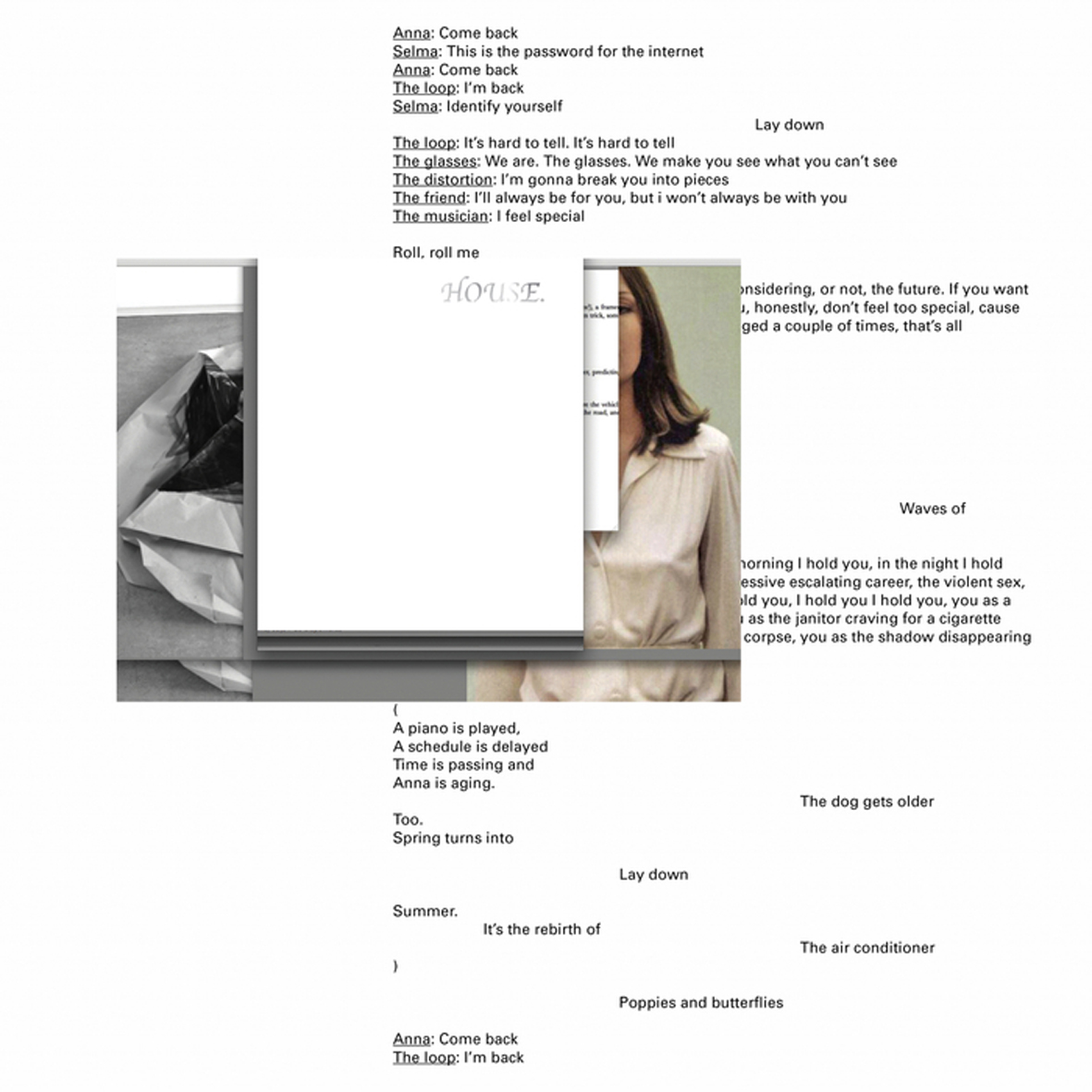 I have historically not followed Felicia Atkinson’s prolific career too closely, aside from enjoying the excellent Je Suis Le Petit Chevalier album on Aguirre, but this latest experiment in surrealism/dada/collage/detournement piqued my interest.  For one, it is billed as a "concrète/post-digital oratorio in five parts" and was made in willfully constrained/minimalist fashion using only a laptop with limited software (Atkinson has previously sounded like a one-woman psych-rock band).  Also, it was partially inspired by being frightened as a child by Pierre Henry's "Apocalypse de Jean" and is built upon texts ranging from George Bataille's erotic prose to Felicia's own writings to snippets from random Italian art magazines.  To me, that either sounds like a recipe for a pretentious towering fiasco or a goddamn masterpiece, but the end result is mostly neither, though one piece ("L'Oeil") does manage to veer quite close to the latter.
I have historically not followed Felicia Atkinson’s prolific career too closely, aside from enjoying the excellent Je Suis Le Petit Chevalier album on Aguirre, but this latest experiment in surrealism/dada/collage/detournement piqued my interest.  For one, it is billed as a "concrète/post-digital oratorio in five parts" and was made in willfully constrained/minimalist fashion using only a laptop with limited software (Atkinson has previously sounded like a one-woman psych-rock band).  Also, it was partially inspired by being frightened as a child by Pierre Henry's "Apocalypse de Jean" and is built upon texts ranging from George Bataille's erotic prose to Felicia's own writings to snippets from random Italian art magazines.  To me, that either sounds like a recipe for a pretentious towering fiasco or a goddamn masterpiece, but the end result is mostly neither, though one piece ("L'Oeil") does manage to veer quite close to the latter.
The album kicks off with "Against Archives," which is built upon an insistent electronic throb beneath a haze of eerie whines and deeply submerged, barely-there chord swells. Then, somewhere past the halfway point, the piece downshifts into just a deep bass pulse and a very industrial-sounding high-hat and Felicia begins softly, tunelessly, and distractedly singing lyrics like "I'm a sister, I'm a lover" like someone who has no idea that they are being recorded.  The following "L'Oeil" plunges even further into electronic noise territory, but there is a very appealing push-and-pull between Atkinson's gnarled, crunching white noise waves and snatches of some distant, beautiful piano music.  More importantly, Felicia's vocals are very prominent, sounding like a very intimate, hushed, and hurried confessional that seems at least partially culled from Bataille's "Madame Edwarda."  It also feels simultaneously erotic and macabre (there is a repeating line about hanging from a shower curtain rod), but apparently chronicles a conversation with a sweater, which is an amusingly wry bit of deception.
The shorter "The Book is the Territory" departs somewhat from noise to drift into some blearily shimmering Je Suis Le Petit Chevalier-style psychedelia, but also throws some disorientingly dramatic synths and heavy electronic textures into the mix as well.  Unusually, Felicia's vocals are nowhere to be found until they slowly emerge from the murk near the end, panning around to unexpectedly share some kind of powerful, difficult-to-decipher heartache.  The completely instrumental "Carve the Concept and the Artichoke" then plunges into murky and warped dark ambient territory before suddenly giving way to a discordantly played solo piano and a disjointed drum beat amidst some very evil-sounding breathing and dripping sounds.  The closing "Recherche De La Base Et Du Sommet" initially seems like it is going reprise quite a similar formula, but then abruptly transforms into a howling gale of hisses, moans, and metallic grinding as Felicia begins her reading Rene Char's poem of the same name (or some cut-up variation of it, as I do not understand French).  Then the piece dissolves into cavernous moans and snarls of noise and Atkinson sets down her microphone and begins loudly crumpling up paper amidst all the chaos, which is an appropriately weird end for a deeply weird album.
For the most part, I enjoyed A Readymade Ceremony quite a bit, but there are a number of elements to it that I find perplexing or exasperating (and not in a "this art is too challenging for me to comprehend" way).  For one, the album is ostensibly a significant divergence for Atkinson due to its text-based nature, but I found her abandonment of conventional instrumentation to be equally radical.  Felicia had previously staked-out some very appealing territory for herself as a purveyor of warmly hallucinatory instrumental reveries, which would have provided a great backdrop for this experiment.  It seems regressive to completely abandon an entire successful aesthetic in favor of becoming a better-than-average texture-centric laptop noise artist, though Felicia's colder and more menacing backdrop admittedly serves her quite well in "L'Oeil."  My other issue is that much of Atkinson’s text-collage alchemy–the album's raison d’être–was lost on me, either reduced to only a few understandable phrases or spoken in a language that I do not understand.  Granted, not knowing French is my problem, but it is worth noting that listeners need to be at least bi-lingual to fully unravel A Readymade Ceremony's mysteries.
Thankfully, Atkinson's voice still can be very effective even when the specific content is lost and its alternately sensual, conspiratorial, and vulnerable presence is a very effective counterbalance to the largely inhuman musical backdrop.  It is not a complete success though.  At its worst, A Readymade Ceremony sounds like a decent noise album or installation piece, which is a definite downgrade from Atkinson's past high points.  "L'Oeil" is inarguably ten minutes of uniquely haunting inspiration though and "The Book is the Territory" is not terribly far behind, which means that A Readymade Ceremony is at least half of an absolute triumph.
 
Read More

